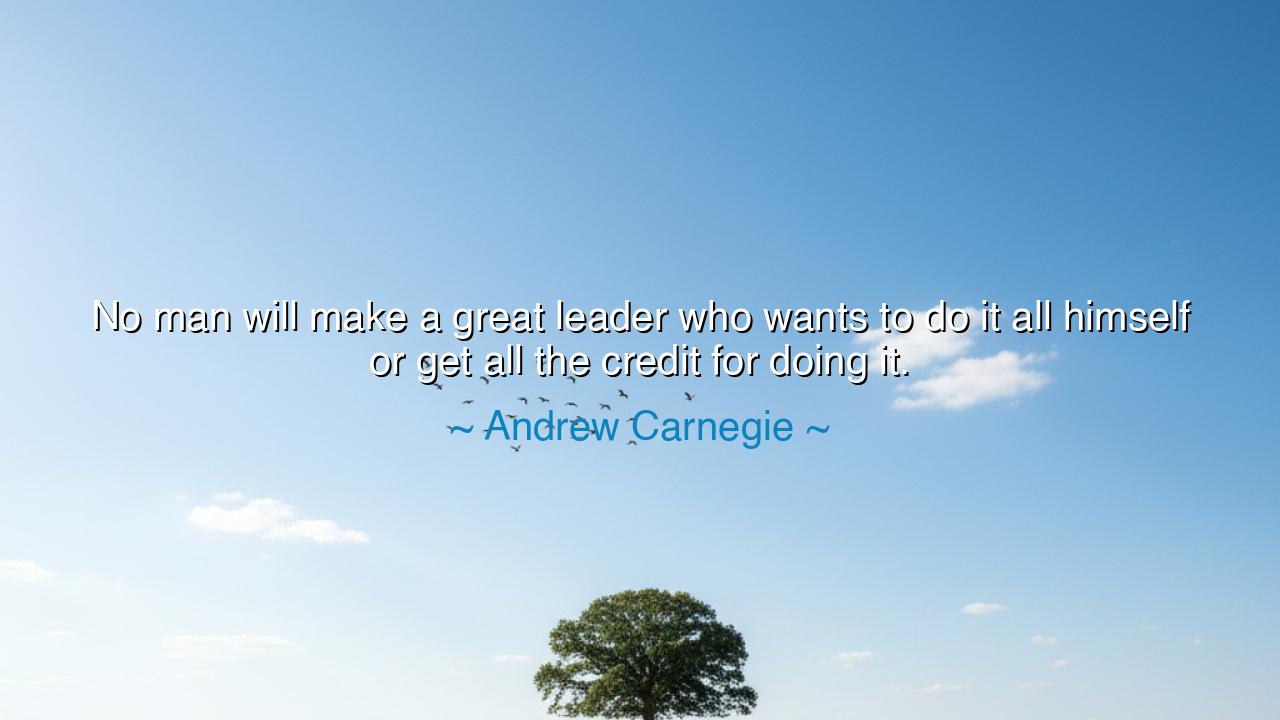
No man will make a great leader who wants to do it all himself or
No man will make a great leader who wants to do it all himself or get all the credit for doing it.






In the words of Andrew Carnegie, “No man will make a great leader who wants to do it all himself or get all the credit for doing it.” These words, simple yet radiant with truth, are a beacon for all who seek to guide others, to build, or to leave a mark upon the world. Carnegie, the great industrial titan and philanthropist of the 19th century, speaks here not as a conqueror of wealth but as a student of wisdom. His insight reveals the heart of true leadership — that greatness is not found in self-glory or domination, but in the power to trust, uplift, and unite others in a shared vision. The man who clings to his own pride may achieve, but the man who shares his purpose will endure.
The origin of this quote comes from Carnegie’s reflections on his own extraordinary journey — from a poor Scottish immigrant to one of the wealthiest men in history. Rising from the depths of poverty, he built an empire of steel and innovation, yet his true genius was not in the iron he forged, but in the men he inspired. Carnegie understood that the foundation of any empire, whether in business or in spirit, is not the labor of one, but the harmony of many. He was a builder of teams, a cultivator of talent, and a believer in the strength of collective effort. Thus, his words are not a theory spoken from comfort, but a truth hammered on the anvil of experience.
When Carnegie warns that no man can lead who wishes to “do it all himself,” he speaks against the disease of ego — the illusion that one’s own brilliance is enough to shape the world. Leadership, he reminds us, is not about control, but about trust. The wise leader does not hoard power; he multiplies it by sharing it. He sees in others not servants, but partners; not tools, but kindred minds. Like the conductor of an orchestra, he understands that his greatness lies not in playing every note, but in drawing forth the music from all who play under his hand. To lead well is to awaken greatness in others.
History is rich with the truth of this. Consider Abraham Lincoln, who surrounded himself not with flatterers, but with rivals — men of differing opinions, sharp tongues, and strong wills. He knew that his own wisdom would be incomplete without the counsel of others. He invited debate, endured criticism, and built consensus through humility. And because of this, he was able to hold a fractured nation together through the fire of civil war. His leadership was not the tyranny of ego, but the triumph of collaboration — proof that the strongest leaders are those who build others rather than glorify themselves.
On the other hand, history also bears witness to those who fell through pride. Napoleon, whose genius on the battlefield was unmatched, grew deaf to the advice of his generals, believing his judgment infallible. His brilliance became blindness, his confidence arrogance, and his empire crumbled beneath the weight of his own vanity. Thus, Carnegie’s warning is eternal: the man who seeks all credit will one day stand alone — surrounded by silence, abandoned by those he refused to honor. Leadership that feeds only the self will wither, but leadership that nourishes others will bloom across generations.
The heart of Carnegie’s wisdom lies in the understanding that credit shared is strength multiplied. To give recognition freely is not to lose power, but to magnify it. The wise leader knows that gratitude is the language of greatness — that when others are celebrated, they become loyal not to authority, but to purpose. And in this unity of spirit lies the true foundation of lasting achievement. To lead with humility is to light a flame that outlives one’s name.
The lesson, then, is clear and timeless: cast aside the hunger for applause. Do not strive to do all things alone, for solitude breeds stagnation. Seek instead the strength of the many — listen, delegate, trust, and honor. Surround yourself with those who challenge you, who think differently, who dare to speak truth. And when triumph comes, let the glory rest upon all, for in doing so, you build not followers, but believers.
So, my children of this modern age, remember the words of Andrew Carnegie — that leadership is not a crown to be worn, but a fire to be shared. The man who demands all credit is like a star that burns itself alone; the man who gives freely of light becomes the sun that warms the world. Lead not for yourself, but for others; build not for your name, but for the generations to come. For greatness is not in doing everything — it is in inspiring others to do it with you.






AAdministratorAdministrator
Welcome, honored guests. Please leave a comment, we will respond soon